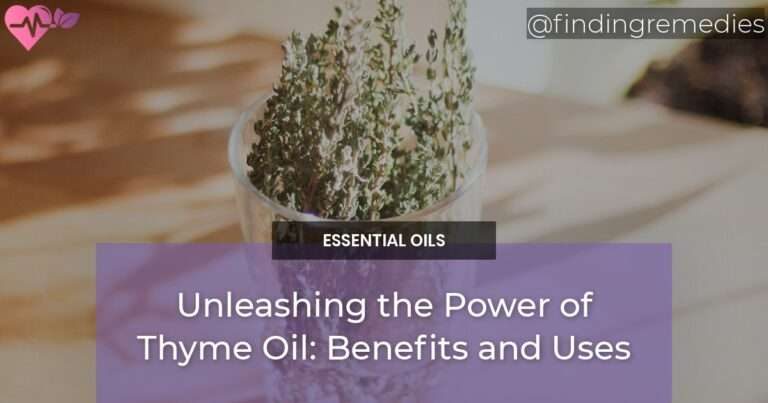Are you looking for a natural remedy for a variety of illnesses? Well, look no further than thyme oil! This ancient essential oil has been used for centuries to treat a variety of ailments, from respiratory issues to skin problems. In this article, we’ll explore the many benefits and uses of thyme oil and how it can be used to improve your health and wellbeing. We’ll also discuss the differences between thyme oil and other essential oils, as well as how to use it safely and effectively. So, if you’re looking for a natural remedy for a variety of ailments, read on to learn more about the power of thyme oil.
Table of Contents
What is Thyme Oil?
Thyme oil is an essential oil derived from the Thymus vulgaris plant, a member of the mint family. The plant is native to the Mediterranean region and is widely cultivated for its culinary and medicinal properties. Thyme oil has been used for centuries for its antiseptic, antifungal, and antibacterial properties.
Chemical Composition of Thyme Oil
Major Components of Thyme Oil
Thyme oil is composed of a complex mixture of chemicals, including thymol, carvacrol, p-cymene, and gamma-terpinene. These compounds are responsible for the many health benefits of thyme oil.
Properties of Thyme Oil
Thyme oil has a warm, spicy aroma and is pale yellow in color. It is known for its antiseptic, antibacterial, and antifungal properties, making it a popular choice for treating respiratory and skin infections.
Extraction Process of Thyme Oil
Thyme oil is extracted from the leaves and flowers of the Thymus vulgaris plant through a process of steam distillation. The oil is then collected and bottled for use.
Benefits of Thyme Oil
Health Benefits of Thyme Oil
– Thyme oil is a powerful antiseptic and can be used to treat respiratory infections such as bronchitis, coughs, and colds.
– Thyme oil is also effective in treating skin infections such as acne, eczema, and psoriasis.
– Thyme oil can be used to relieve pain and inflammation associated with arthritis and muscle pain.
– Thyme oil can help improve digestion and has been used to treat digestive disorders such as bloating, gas, and indigestion.
– Thyme oil can boost the immune system and help fight off infections and diseases.
Psychological and Emotional Benefits of Thyme Oil
– Thyme oil has a calming effect on the mind and can be used to reduce anxiety and stress.
– Thyme oil can help improve concentration and memory.
Uses of Thyme Oil
Therapeutic Uses of Thyme Oil
– Thyme oil can be used in aromatherapy to promote relaxation and reduce stress.
– Thyme oil can be used topically to treat skin infections and promote healing.
– Thyme oil can be used in massage therapy to relieve pain and tension in the muscles.
Culinary Uses of Thyme Oil
– Thyme oil can be used as a flavoring in cooking and baking.
– Thyme oil can be added to marinades, dressings, and sauces for added flavor.
Other Uses of Thyme Oil
– Thyme oil can be used as a natural insect repellent.
– Thyme oil can be added to cleaning products for its antiseptic properties.
Safety and Risks of Using Thyme Oil
Health and Safety Considerations
– Thyme oil should be diluted before use, as it can cause skin irritation and sensitization in some individuals.
– Thyme oil should not be used during pregnancy or by individuals with high blood pressure.
Potential Risks and Side Effects
– Thyme oil can cause skin irritation and sensitization in some individuals.
– Thyme oil should not be ingested in large quantities, as it can be toxic.
Precautions to Take When Using Thyme Oil
– Always dilute thyme oil before use.
– Do a patch test before using thyme oil topically to check for skin sensitivity.
– Do not ingest thyme oil in large quantities.
How to Use Thyme Oil
Application Methods
– Thyme oil can be used topically by diluting it in a carrier oil such as coconut oil or jojoba oil.
– Thyme oil can be used in a diffuser for aromatherapy purposes.
Dosage and Dilution
– A safe dilution ratio for thyme oil is 1-2 drops of thyme oil per 1 teaspoon of carrier oil.
Blending Thyme Oil with Other Essential Oils
– Thyme oil blends well with other essential oils such as lavender, lemon, and rosemary.
Additional Tips for Using Thyme Oil
– Always store thyme oil in a cool, dark place away from sunlight.
– Do not use thyme oil if it has expired or has gone rancid.
– Always consult with a healthcare professional before using thyme oil for medicinal purposes.
By following the guidelines mentioned in this article, you can unleash the power of thyme oil and enjoy its many benefits safely and effectively.

